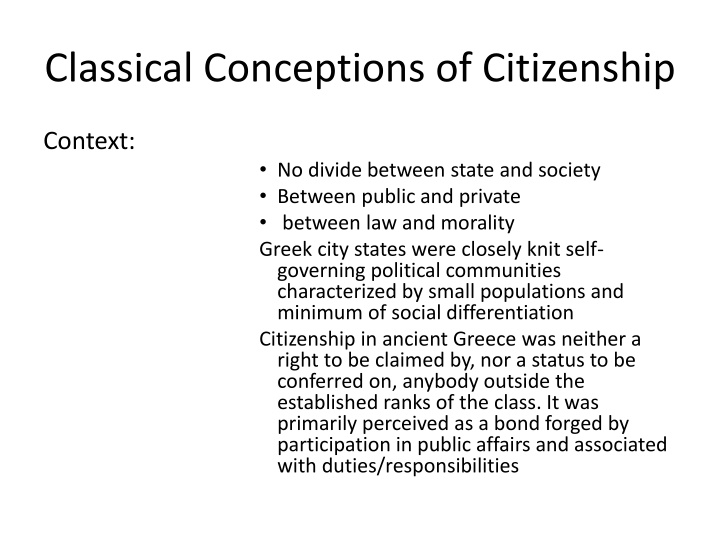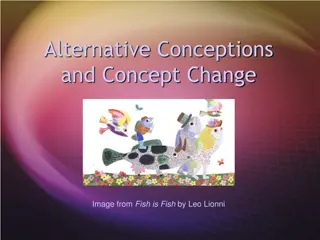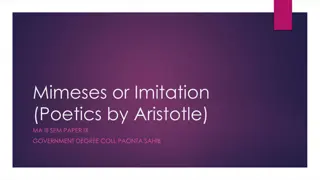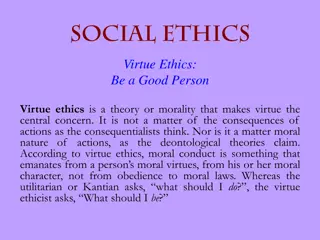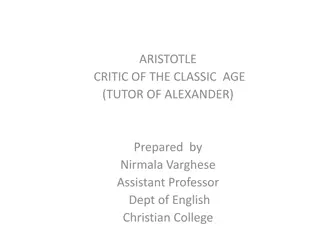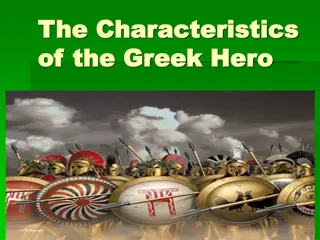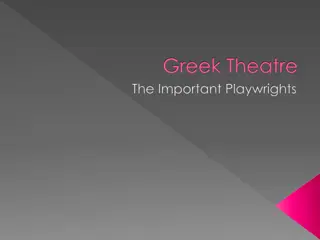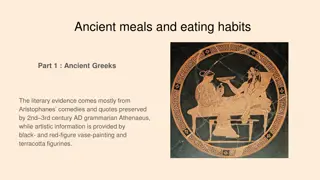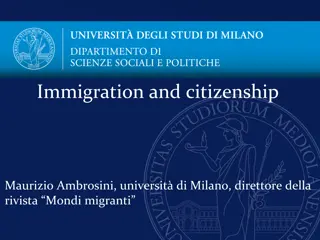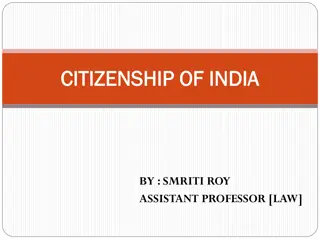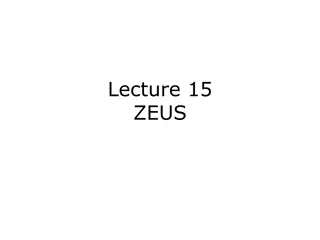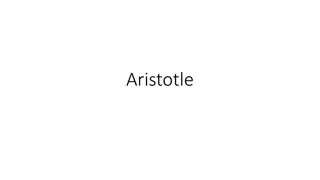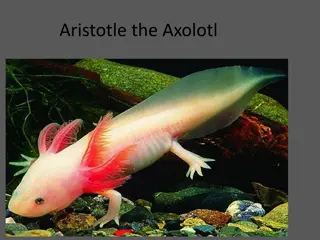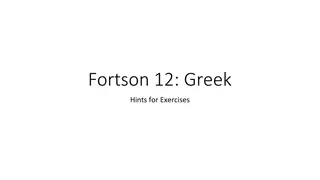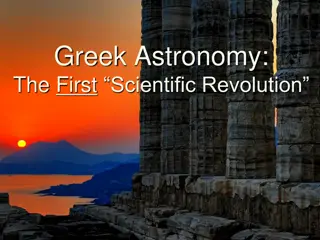Ancient Greek Conceptions of Citizenship by Aristotle
Ancient Greek conceptions of citizenship, as discussed by Aristotle, emphasized the close-knit nature of city-states, where citizenship was a bond forged by active participation in public affairs. Citizenship was viewed as a privilege, exclusive in nature, with a strong emphasis on civic virtue, trust, and political participation. Exclusions from citizenship included slaves, women, and foreigners. Aristotle believed that the polis, or city-state, was a natural evolution reflecting the pursuit of the good life and self-sufficiency.
Download Presentation

Please find below an Image/Link to download the presentation.
The content on the website is provided AS IS for your information and personal use only. It may not be sold, licensed, or shared on other websites without obtaining consent from the author.If you encounter any issues during the download, it is possible that the publisher has removed the file from their server.
You are allowed to download the files provided on this website for personal or commercial use, subject to the condition that they are used lawfully. All files are the property of their respective owners.
The content on the website is provided AS IS for your information and personal use only. It may not be sold, licensed, or shared on other websites without obtaining consent from the author.
E N D
Presentation Transcript
Classical Conceptions of Citizenship Context: No divide between state and society Between public and private between law and morality Greek city states were closely knit self- governing political communities characterized by small populations and minimum of social differentiation Citizenship in ancient Greece was neither a right to be claimed by, nor a status to be conferred on, anybody outside the established ranks of the class. It was primarily perceived as a bond forged by participation in public affairs and associated with duties/responsibilities
Aristotles Views on Citizenship Citizen was one who enjoyed the right of sharing in deliberative and judicial office Who shared in the civic life of ruling and being ruled in turn Organization of the Republic: Based on the notions of familiarity and trust, Commitment to civic virtue and the common good, Principles of active political participation, The prioritization of public and political aspects of life over private interests, and the primacy of man as citizen Status of citizenship was highly exclusive: Inequality of status was accepted without question It was valued in part because of its exclusive nature and because it stood as a mark of superiority over non-citizens, a privileged status. So hierarchy and exclusion-
Aristotles Views of Citizenship (Contd.) List of Exclusion: Slaves were excluded from citizenship as they lacked the deliberative faculty Women were excluded for lacking the necessary rationality required for political participation Metis (People of foreign origin)
Aristotles Teleological Explanation Man is by nature a political animal (Zoon Politikon). At the core of this statement there is an account of the origins of political community or the polis- how it comes into being for natural reasons and exists for the sake of the good life, which is the end of the political community. Nature, for Aristotle, reflects the very process of evolution- Polis-grown out of natural partnerships such as the household and village.
Aristotles Teleological Explanation(Contd.) Polis is natural because it fulfils the end to which human life tends-self sufficiency All partnerships are natural in that they serve the ends of self-sufficiency. The polis or the city-state while coming into being for the sake of living --- -exists for the sake of living well As a form of political partnership, polis is higher than other forms of partnership for it enables and directs us towards the good life The aim of the good life of the polis is a natural end, its telos Being the highest form of partnership the polis is prior by nature to the household and to each of us Thus the whole must of necessity be prior to the part Citizenship must, therefore, be geared towards the goals of the polis Aristotle for a regime-differentiated understanding of citizenship-region- specific citizenship where the nature of citizenship varies from regime to regime
Aristotles Justification of Hierarchy Aristotelian description of citizenship as ruling and being ruled in turn or as by sharing in decision and office seems to be in contrast to the Platonic Ideal in which ruling is a prerogative of a distinct class. Aristotle steps down from this ideal in order to accommodate the practice of sharing power among active partners as equal citizens. But the universe of citizenship in a Greek Polis was restricted to adult males born to members of the same community. So the core principles of citizenship in Greek city states were hierarchy and exclusion. Justification: For Aristotle the idea of ruling and being ruled in turn must apply to things advantageous . immediately from birth certain things diverge, some toward being ruled, others toward ruling . Soul rules the body, intellect rules over appetite It is advantageous for both the body and the appetite to be ruled by the soul and the intellect. This explains the hierarchical relations in society-
Aristotles Justification of Hierarchy(Contd.) Thus the axiom of ruling and being ruled in turn would only apply among equals. Master-slave, male-female, by nature a relation of superior to inferior and ruler to ruled. In building these relationships of inequality Aristotle is making a larger case for separating the household (oikos) from the polis By separating the work of the master from that of the slave and man from woman, Aristotle s polis builds up a public sphere that belongs only to adult males In this arbitrary distinction perhaps there is both a bit of conventionalism (justifying the prevalent convention of slave- owning) and also a perceived need within the Aristotelian system, to free males from everyday chores and thereby allow them more time to participate as active citizens.
Republican Aspects of Citizenship Aristotle requires citizens to inculcate certain virtues that will prove crucial in the pursuit of the good life Without proper laws and education, people are liable to degenerate in various ways Citizens need to have the right habits instilled in them, both by a regime of education and by appropriate laws. Aristotle further makes a stronger case for the rule of law over the rule of men.
Republican Aspects: Rule of Law(Contd.) Law, according to Aristotle, is intellect without appetite. Aristotle claims, just as man is the best of animals when completed, when separated from law and adjudication he is the worst of all . Laws shape citizens characters, and education fosters a collective spirit Aristotle favours a state-sponsored education programme which should be common to all. Much of the contemporary revival of civic republicanism is inspired by Aristotle.
